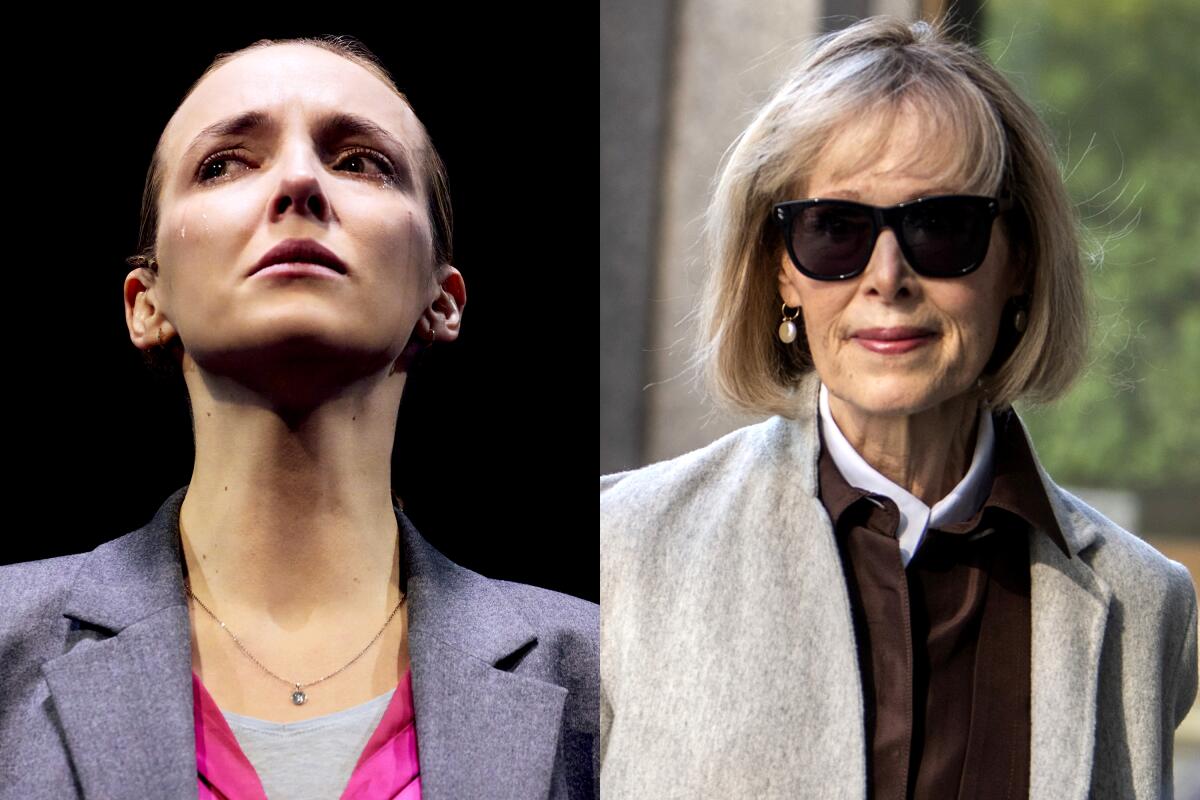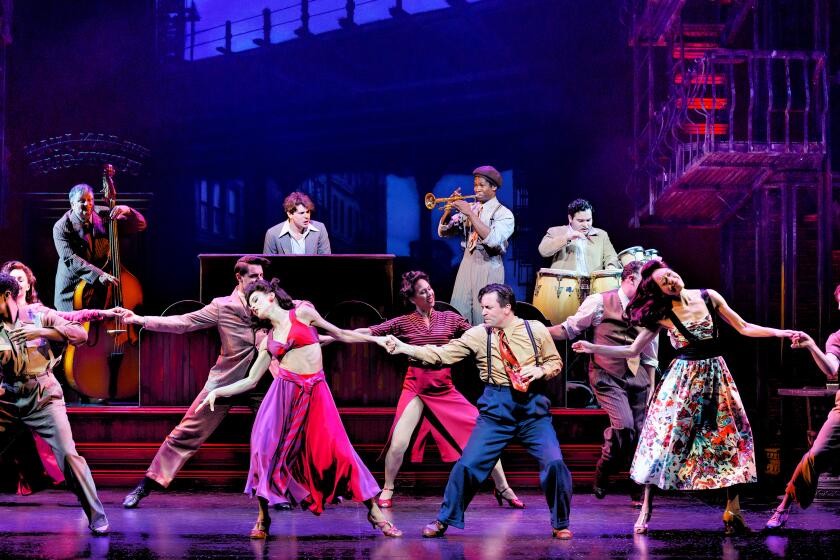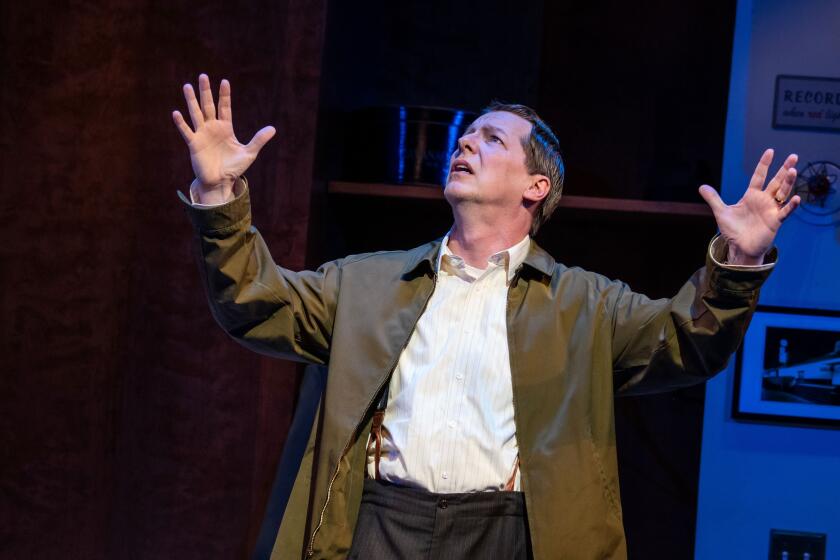Commentary: Jodie Comer on Broadway echoes the pain and fury of the Trump rape trial

- Share via
NEW YORK — “Prima Facie,” the one-woman play starring Jodie Comer now on Broadway, forensically examines the way rape survivors are put through the wringer by the judicial system. It’s an ideal guide for understanding what E. Jean Carroll is up against in the civil trial against Donald Trump, whom she has accused of raping her in the mid-1990s in a New York department store.
On Wednesday, Carroll took the stand and recalled in harrowing detail what occurred to her in a Bergdorf Goodman dressing room on the afternoon she bumped into Trump at the store and agreed to help him pick out a gift for another woman. The two weren’t friends but ran in the same New York media circles, Trump as a real estate magnate and tabloid fixture and Carroll as an advice columnist who had her own cable show.
Fame brought them together, but the giddy New York scene took a sudden violent turn from its “Breakfast at Tiffany’s” beginnings, Carroll alleged. Caught up in the “joshing and light” banter, she said, she followed Trump into the lingerie department, where he asked her to try something on. She told the court that she had no intention of doing so. But in the flirtatious, comic spirit of their encounter, she went into the dressing room. It was there, she said, that he shoved her against the wall and sexually assaulted her.
Carroll testified that she didn’t scream but fought back. She stomped on Trump’s foot, she said, but it was only when she kneed him that she was able to make her escape. Her body was in pain, she recalled, but the psychological damage has been more lasting.
“It had lifelong consequences,” she said. “It left me unable to ever have a romantic life again.”
Carroll testified on Wednesday, “I’m here because Donald Trump raped me, and when I wrote about it, he said it didn’t happen. He lied and shattered my reputation and I’m here to try to get my life back.”
What happens next in the trial is no mystery. The defense has already begun its campaign to undermine the credibility of the accuser. The playbook is frustratingly familiar. Gaps in memory or indications of friendliness or familiarity are exploited. Any chance of mucking up the motivation of the accused is seized upon. The character of the survivor is both subtly and unsubtly attacked. Ambiguity, strategically cultivated, encourages reasonable doubt, no matter how unreasonable, to grow.
The business of the defense is the kind of narrative warfare that Comer’s character in Suzie Miller’s “Prima Facie” specializes in. A criminal defense barrister in England, where the Olivier-winning play is set, Tessa Ensler is a rising legal star who prides herself on her ability to play “the game of law.”
“A good lawyer just tells the best version of their client’s story,” she says cavalierly early in the play. “Nothing more. Nothing else.”
With unflagging energy and grit, Comer (who won an Emmy for her starring role in “Killing Eve” and an Olivier Award for her London performance in this international hit play) conveys the ambition and tactical shrewdness of a young lawyer who is determined not to let her gender or working-class background hold her back in a field dominated by private-school types with posh accents and patriarchal attitudes. (Miller, a former criminal defense lawyer from Australia, where “Prima Facie” was first done, knows of what she writes.)
At Cambridge University, where Tessa studied law, she was not expected to excel, but she keeps surprising not only her peers but also herself. The legal term “prima facie” comes from the Latin for “at first sight” or “based on first impression.” Tessa knows better than most how misleading appearances can be, and she uses this knowledge to her professional advantage.
Winning becomes everything. Guilt and innocence are not her concern. Due process is how she justifies her actions. “If a few guilty people get off then it’s because the job was not done well enough by the prosecutor and the police,” she explains.
But Tessa experiences the manipulative nature of law in a different way after she’s raped by a colleague. She is acutely aware that her case is a difficult one despite the clear-cut nature of the assault.
There’s nothing ambiguous about the way she was held down by a man, who forcibly covered her mouth and rendered her unable to free herself from an unfolding nightmare. The scene plays over in her mind, casting her in a role she has resisted her entire life.
“I don’t want to be a victim, she says. “Damaged. Nope. No, I want to be a survivor, but …”
Vocabulary momentarily fails her.
Martin Scorsese’s 1977 film has been turned into a shlocky Broadway musical despite a Kander and Ebb score and additional lyrics by Lin-Manuel Miranda.
In the immediate aftermath, Tessa is already imagining the strategies the defense counsel will deploy. Adopting her court voice, she starts raising questions about how much alcohol was consumed and whether she had invited him back to her place and taken off most of her own clothes.
At the police station she is subjected to a battery of questions, several of which she is incapable of answering.
“Where was this hand? Your leg? His arm?
“Will he have marks where you fought him?”
When she explains that she is a defense barrister, she receives a flat reply from the officer: “Now you need us though, don’t you?”
This production of “Prima Facie,” directed by Justin Martin at the John Golden Theatre, is at its strongest when focused on the complicating details of Tessa’s case. This is traumatic material, but stories like Tessa’s and Carroll’s provide a necessary public service in clearing up the nature of consent.
Sean Hayes stars on Broadway in ‘Good Night, Oscar,’ Doug Wright’s dark comedy following pianist Levant as he’s being treated for mental illness.
A high-profile court case like Carroll’s dispels the idea that rape must involve a perfect stranger in a dark alley at knifepoint. The circumstances may be playful at first and set even in a high-end retail paradise. A play like Miller’s clarifies that the context can also be intimate, messy and fueled with wine and still be unambiguously brutal. Crimes are still crimes even when they are committed by someone successful, magnetic and charming.
Even if Carroll doesn’t prevail she is advancing our collective understanding and thereby notching a significant win. To courageously come forward in this way is no doubt retraumatizing for her, but society has reason to be grateful.
The accumulation of these stories has an effect even if progress is too slow and backsliding is inevitable. The #MeToo movement offers proof that a culture can change — slowly and by degrees.
The pooling of human experience in such disparate forums as a courthouse and a Broadway theater enables the public to become more adept at separating superficial ambiguity from stark unambiguous reality. “Prima Facie” and E. Jean Carroll are honing the critical thinking skills upon which social justice depends.
More to Read
The biggest entertainment stories
Get our big stories about Hollywood, film, television, music, arts, culture and more right in your inbox as soon as they publish.
You may occasionally receive promotional content from the Los Angeles Times.













